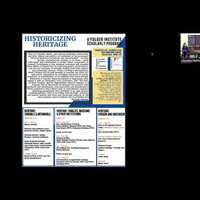Workshop Discourse
Conference Reflections
Taking place at the end of an academic year and after two years of the covid pandemic, the Historicizing Heritage workshop provided an unexpectedly restorative opportunity to reflect on the evolution of my work and marvel at the work of others. It was invigorating to learn about the wildly innovative projects of colleagues in the arts and humanities and refreshing to exchange ideas with peers from such a varied selection of disciplines and professions. I have particularly dwelled upon the thornier side of "historicizing heritage," as I will have to confront it in upcoming research and writing. Who decides what is "historical," particularly when the history in question is that of violently subjugated communities whose rights and very existence have been denied by the federal governement? Who defines the "heritage" of those who have been forced to remain as invisible as possible just to survice? There are no easy answers to these questions, but it is reassuring to have found a community of scholars and artists so deeply engaged with the search for them.
Kim Borchard, Professor - Spanish, Randolph-Macon College
________________________________________________________________________
I've been thinking about the phenomenological aspects of melting heritage some more, especially after meeting the artist Devora Neumark at the “Watersheds” symposium I co-planned at UD last June. What, for instance, does the shift from tangible->intangible taste like? Two items on my mind:
- Her “Letters to the Ice” (2021)
- ‘The Caribou Taste Different Now’: Inuit Elders Observe Climate Change, ed. José Gérin-Lajoie, Alain Cuerrier, and Laura Siegwart Collier (Iqaluit: Nunavut Arctic College Media, 2016)
Lowell Duckert, Professor - English, University of Delaware
________________________________________________________________________
This was my first academic conference, and I really enjoyed the various conversations and interweaving of conversations that resulted from the widespread topics surrounding the idea of "heritage." From heirloom "Bloody Butcher" corn, a deep, almost bloodred ear of corn native to West Virginia, to conversations about the generative properties of Barry Lopez's Artic Dreams and its effect on the definitions and understanding of ice, to talking about some of the earliest Cuban music on record, the topics in this conference spanned a breathtaking distance. Perhaps what I will take away the most from this three day conference was the warmth and candor of the participants, the openness of the intellectual conversations, and each participants willingness to talk to anyone about anything. There was so much genuine curiousity and interest here -- it was remarkable.
Jackson Buttery, MFA Student, West Virginia University
________________________________________________________________________
As a creative writer, I heard quite a few presentations that, while interesting, weren’t terribly applicable to my work (creative nonfiction about the Kentucky women in my family tree) and where I wanted to go with it. While I enjoyed hearing from all the various presenters at the Historicizing Heritage workshop, the session that had the most significant impact on me in terms of content and also artistic resonance was the creative nonfiction reading by Ann Pancake. I came into the workshop unfamiliar with her work but excited to hear from someone in my field who has a truly excellent/super fun name. When Ann read her essay, “Take, Eat” about her family’s cultural tradition of deer hunting and what that meant to the survival of her family and also the ways in which she was included and excluded based on her girlhood, I was immediately transfixed. I actually emailed Ann months later, thanking her for sharing such meaningful work with us and asking where I could read her essay, and she was kind enough to send it back as an attachment. The cadence of her writing (which was so richly echoed in her reading tone); the thematic work she did with place, family, tradition, and girlhood; and the sentence-level craft are all tools I plan on breaking apart, studying, and trying my hand at as I dig back into my family tree writing project.
Angie Romines, Senior Lecturer - Department of English, The Ohio State University
________________________________________________________________________
